Kamala: The Lotus Goddess of Prosperity and Fertility

Goddess Kamala is the tenth and last Mahavidyas within Shaktism and Tantra tradition, a female oriented worship of the divine; wherein the Divine Feminine is believed to be the ultimate reality. Within the Tantra tradition, Kamala is believed to be a form of Lakhsmi, the goddess of prosperity and fertility. The word Kamala means lotus, and stands as a symbol of purity, beauty, and spiritual power. Goddess Kamala is also known as Kamalatmika in Sanskrit which means the one who dwells in lotuses.
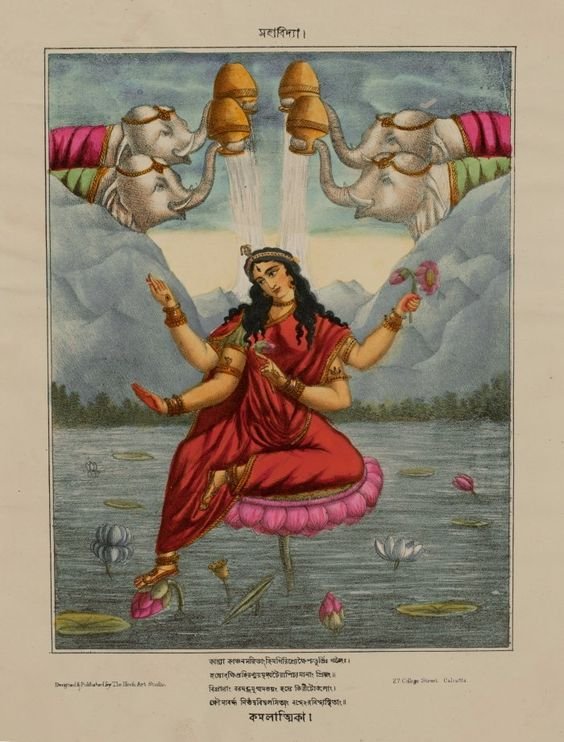
Goddess Kamala is intricately linked with Goddess Lakshmi, who is said to have emerged during the churning of the cosmic ocean or the milk ocean by the gods and demons. In Hindu scriptures like Vishnu Purana, attest that Lakshmi rises from the ocean seated on a lotus, adorned with divine splendour. Kamala, as the Tantric aspect of Lakshmi, is worshiped in the Shakta tradition, where she is celebrated as one of the Dasa Mahavidyas. Both Kamala and Lakshmi have roots in the Vedic and Puranic traditions. Lakshmi, known as the goddess of wealth, fortune, and prosperity, is one of the most worshiped deities in Hinduism. She makes appearances in various myths which detail her role as the consort of Lord Vishnu, the preserver of universe and one of the Trimurti in Hinduism. On the other hand Tantric texts describe Kamala as one of the Dasa Mahavidyas that represents the ultimate form of Lakshmu.
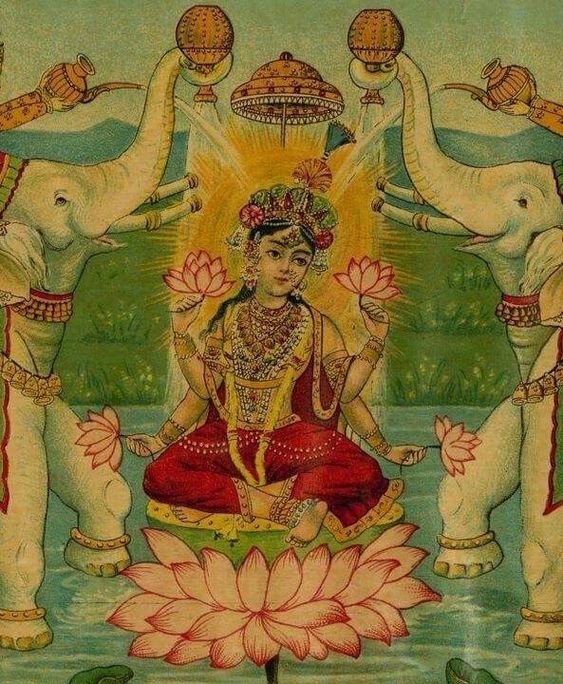
Lakhsmi is universally known as the goddess of wealth, fortune, and prosperity. Her worship is aimed at gaining material abundance, financial stability, and overall well-being. She is invoked during important festivals like Diwali, where devotees seek her blessings for a prosperous year ahead. Kamala, as the Tantric form of Lakshmi, has similar attributes but with a much deeper esoteric significance. In Tantric practices, she is not only viewed as the provider of material wealth but also seen as the key to spiritual abundance. Kamala in this tradition teaches that true prosperity comes by balancing both material wealth and spiritual growth.
While Lakhsmi’s primary associations are with material wealth, she also represents spiritual wealth. She is believed to be the goddess of Dhanya, Dhana, and Santana, showcasing her role in sustaining life and ensuring prosperity on her devotees for all aspects of life. Kamala as one of the Mahavidya is worshiped to gain spiritual liberation or moksha. Her tantric worship includes meditation practices and rituals that are aimed to awaken the higher consciousness and achieve spiritual enlightenment. In Tantra and Shaktism, goddess Kamala is seen as a manifestation of the one Supreme Goddess, Adi Parashakti. Hence Kamala as the Tantric Lakshmi, symbolizes the culmination of all spiritual and material abundance.
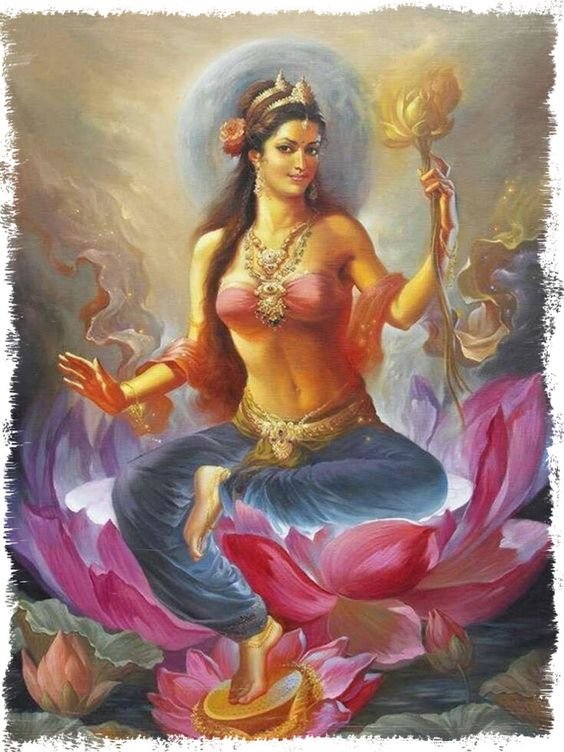
Apart from her most renowned myth of emerging from the Milk Ocean, Kamala is mentioned in various narrations. Another myth highlighting Kamala’s attributes of generosity, prosperity, and divine favour is mentioned in the tale of goddess Kamala and King Bali. King Bali was a demon king and was known for his generosity and devotion for Lord Vishnu. Lord Vishnu, in the form of Vamana, a dwarf Brahmin, approached King Bali during a grand yajna and requested three paces of land. Bali, as the generous king agreed. Vamana then grew in size and covered the entire universe in two steps. With no space left for the third step, Bali offered his own head, demonstrating his devotion and humility. Impressed by King Bali’s devotion and sacrifice, goddess Kamala blessed him with eternal prosperity in the Patalaloka and granted him the boon of visiting the earth once a year during the festival of Onam, where he is welcomed and revered.
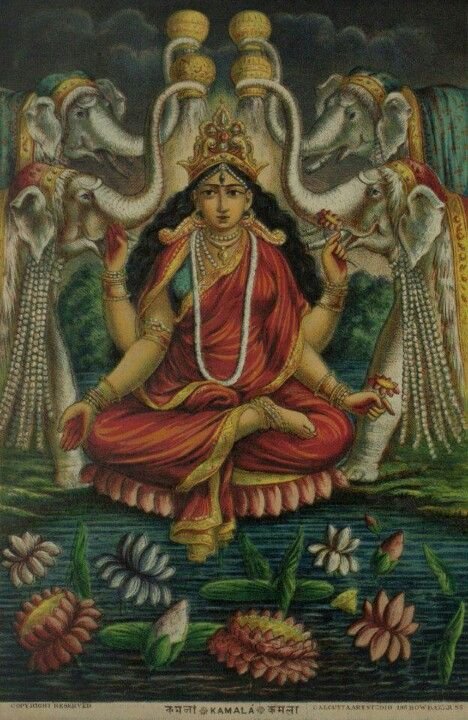
Goddess Kamala in her iconography is depicted seated or standing on a fully bloomed lotus flower. The lotus is a powerful symbol in Hindu iconography, representing purity, beauty, and spiritual transcendence. This position of her signifies her purity and her divine form being above worldly realms. The lotus also symbolises spiritual enlightenment and divine beauty. Goddess Kamala is portrayed with four arms. These arms represent her ability to bestow various blessings and her all-encompassing nature. In two of her hands, Kamala holds lotus flowers, emphasizing her association with purity, beauty, and spiritual awakening. The lotus is also a symbol of purity and fertility. One of her hands is in the Abhaya Mudra, a gesture that symbolizes protection, reassurance, and fearlessness. The other hand of hers in is Varada Mudra, a gesture that represents her ability of boon giving.
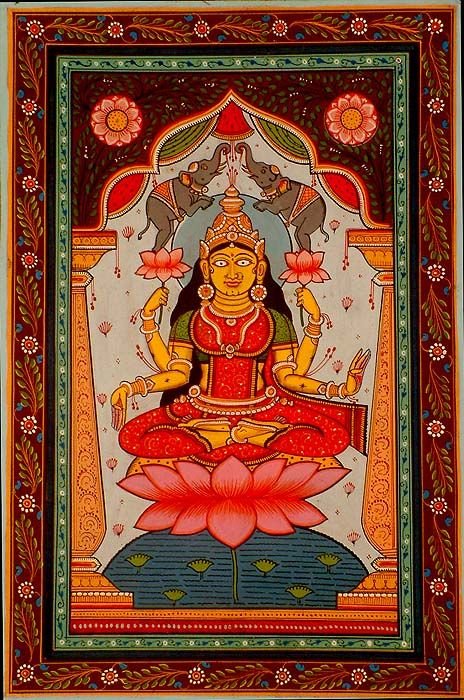
Goddess Kamala in her depictions is golden in complexion; this golden hue of hers is a direct representation of the goddesses’ association with wealth, prosperity, fertility and abundance. Gold, being a precious and incorruptible metal, signifies enduring wealth and the divine light that Kamala is believed to radiate. In her iconography the goddess is depicted with Elephants showering water, representing royal authority, power, and within Hinduism elephants are believed to be a symbol of clouds and rains thus signifying fertility. The act of showering water symbolizes the pouring of divine blessings and the abundance of rain. She is portrayed adorned with garments and jewellery which stands as a status of wealth, beauty and divinity. The background in her depictions often show lush landscapes, lotus ponds, and other natural elements that associate with her attributes of fertility, growth, and the nurturing aspect of hers.
One of the most significant festivals of Kamala is Diwali, the festival of lights. On this occasion, homes are thoroughly cleaned, decorated with rangoli, and lit with numerous lamps. Lakshmi Puja or Kamala puja is done to invoke her blessings for prosperity and well-being. During the festival of Navaratri, the last three days are specifically dedicated to the worship of Saraswati, Lakshmi, and Durga. In general, Fridays are considered auspicious for the worship of Kamala, Many devotees observe a fast and perform special pujas. Full moond days, especially the Purnima in the month of Sharad are also important for the worship of goddess Kamala.
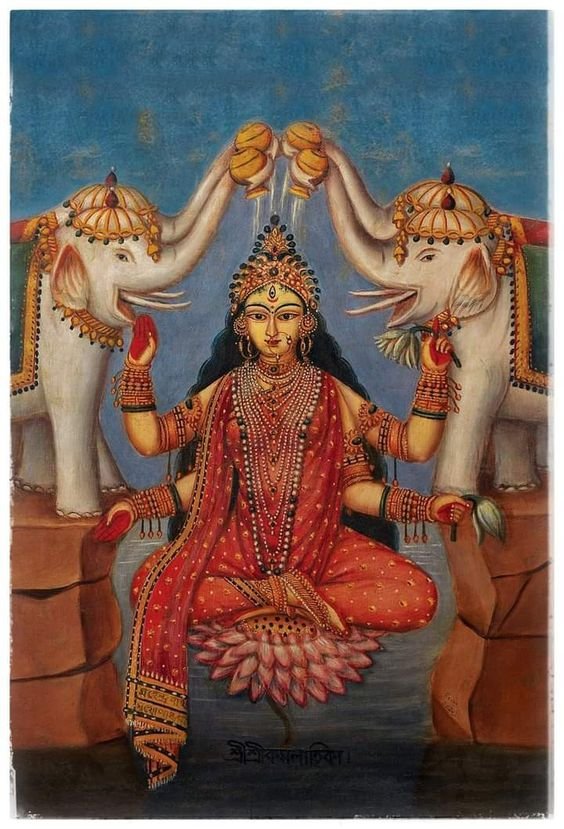
Kamala is worshiped for her ability to grant material wealth and success. Devotees seek her blessings to overcome financial hardships, and overall life success. Daily worship of hers is believed by Hindus to attract opportunities, and enhancement of other financial gains. Kamala also symbolizes purity and beauty, which is represented by the lotus that is her abode as well as the literal meaning of her name. Her worship encouraged her devotees to lead a pure and ethical life, free from greed and corruption. Kamala as the consort of Lord Vishnu embodies the harmonious balance between wealth and preservation. Her worship encourages her devotees to maintain a balance in their lives by integrating material success with spiritual values. Though Lakshmi is seen as a submissive wife, performing her wifely duties for her husband Vishnu, her tantric form of Kamala is more independent and fierce, in that she acts independently on her role as a divinity and less as a consort.
Goddess Kamala’s association with the lotus flower is particularly of importance in Tantra. The lotus grows in muddy waters but rises above them to bloom in the sunlight, symbolizing the soul’s journey towards spiritual awakening. In Tantric practices, the lotus is also associated with Chakras, the energy centres in the body. Kamala, as the goddess of the crown Chakra, represents awakening of spiritual consciousness and the attainment of enlightenment.
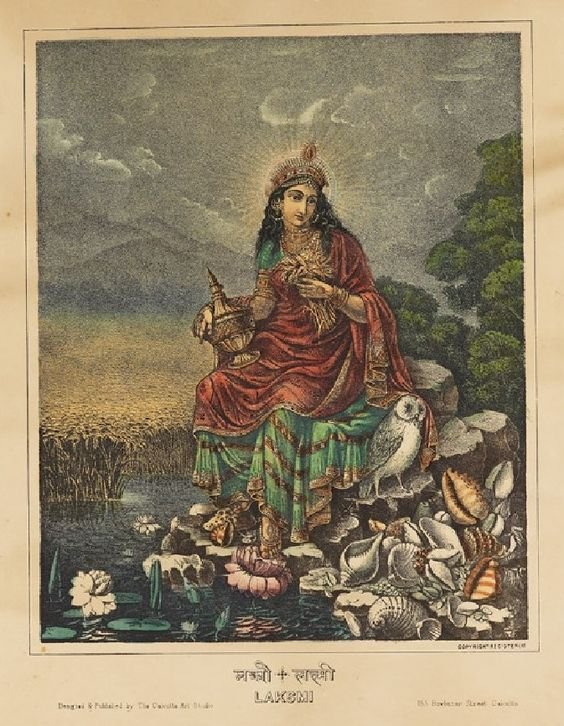
Goddess Kamala, the tenth Mahavidya, holds a unique place in Hindu spirituality. She possesses the divine principles of prosperity, fertility, purity, and spirituality. Through her worship, devotees are able to seek not only material wealth but also the higher goals of spiritual liberation. In understanding and celebrating the goddess, the devotees are reminded that the true essence of prosperity lies in the harmonious balance of material wealth and spiritual growth. Kamalas’s wisdom and generosity continues to inspire and uplift those who seek her blessings, making her a symbol of divine abundance and grace.


